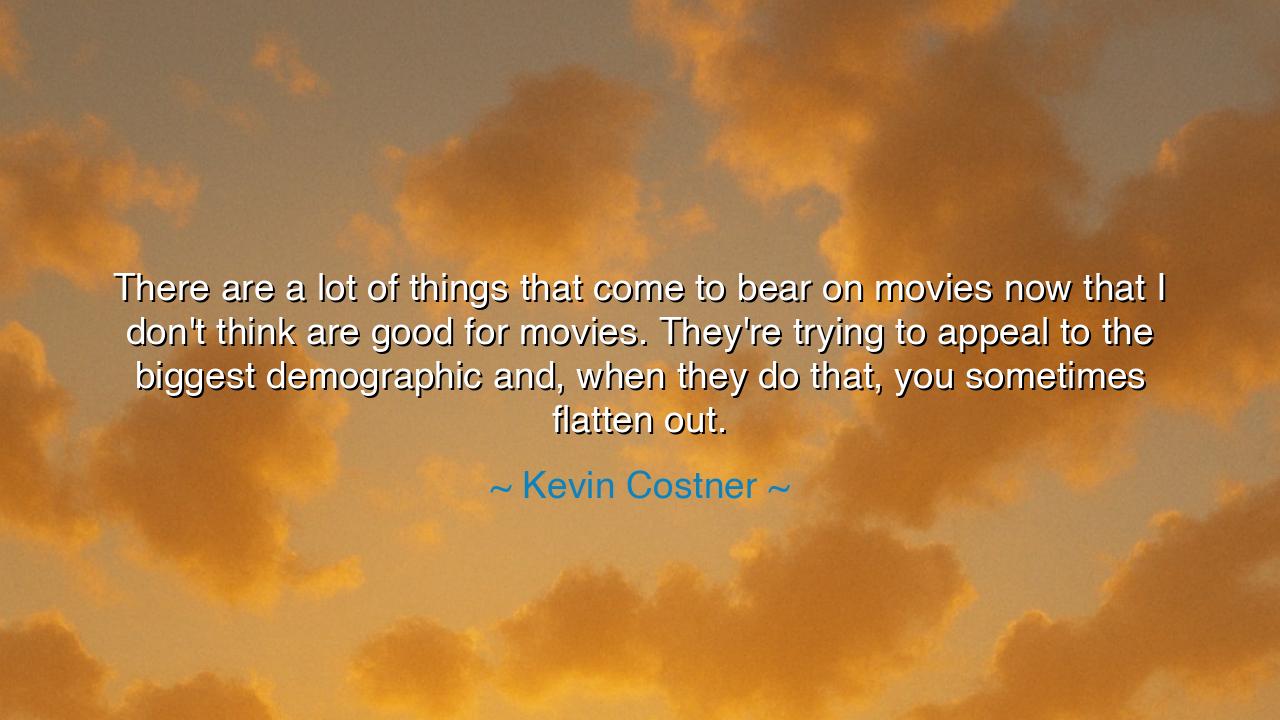
There are a lot of things that come to bear on movies now that I
There are a lot of things that come to bear on movies now that I don't think are good for movies. They're trying to appeal to the biggest demographic and, when they do that, you sometimes flatten out.






Listen closely, children of the future, for the words of those who have seen the arc of time bend and the nature of art shift carry wisdom to guide our path. Kevin Costner, a man whose career has spanned decades of film, once said: "There are a lot of things that come to bear on movies now that I don't think are good for movies. They're trying to appeal to the biggest demographic and, when they do that, you sometimes flatten out." These words speak of the erosion of the authentic in favor of the mass appeal, the loss of the soul of storytelling in the race to capture the attention of the largest possible audience. Costner’s lament is not just about the movies, but about the dilution of what is truly meaningful in the pursuit of widespread approval.
In the ancient world, storytelling was never about pleasing the many; it was about preserving the truths of human experience—truths that might only be understood by those who were willing to listen deeply. The bards of Greece, for instance, sang not just for entertainment, but for reflection, for the preservation of history, and for the exploration of human nature. The Iliad and Odyssey were not written with the intention of appealing to the largest audience, but to reach the hearts of those who would understand their depth and complexity. These stories were filled with both the heroic and the tragic, the light and the dark, for they were meant to challenge the listener, to make them think—not just to offer shallow entertainment. Costner’s words reflect this ancient truth: that when the goal is to cater to the mass rather than to the heart, something essential is lost.
Consider the example of Socrates, the great philosopher of Athens, whose teachings were not designed to win popularity or mass appeal. He often spoke in ways that challenged the norms of society, questioning the very foundation of what people believed to be true. In fact, Socrates was sentenced to death for corrupting the youth of Athens, for refusing to speak in a way that would appease the masses. Socrates’ pursuit of truth—uncompromising and undiluted—shows us that when we prioritize appeal over authenticity, we risk losing the essence of what makes something truly valuable. The moment we start molding ourselves to please the crowd, we begin to flatten our individuality, our creative essence, and the depth of our wisdom.
In modern times, movies and art can often become products of this flattening process. As Costner suggests, the drive to appeal to the broadest possible demographic often results in a loss of artistic depth. Films are increasingly designed to be marketable, to tick off boxes that satisfy the desires of the largest audience, and as a result, they may sacrifice the very elements that make them meaningful. This is not to say that there is no room for enjoyment or accessibility in art, but when everything is crafted to be palatable to everyone, we risk losing the essence of storytelling—the truth that speaks to the heart. The soul of a movie, much like the soul of a person, cannot be defined by mere consensus; it is found in the particular, in the nuances and details that reflect the complexity of life.
Take, for example, the Rise of Rome—a society that, at its height, was revered for its philosophy, its art, and its literature. The works of Virgil, Ovid, and Seneca were not created for mass consumption. Instead, they were deeply personal works that spoke to the challenges of human existence, the complexities of virtue, and the tension between fate and free will. These works were not universally adored in their time, yet they became the foundation of Western thought and were revered by those who sought depth and meaning, not instant gratification. The flattening of Roman thought in later eras, where artistic endeavors were often made to appease the masses, led to a decline in the richness of their intellectual pursuits. Costner’s words warn us that when art becomes only about pleasing the many, we lose the richness that makes it worth our time and attention.
The lesson here, children, is clear: do not compromise the depth of your own creative work or ideas for the sake of widespread approval. In everything you do—whether in your personal lives, your careers, or your art—seek the truth that resonates with the depth of your own experience, not just the surface desires of those around you. Be willing to stand firm in your beliefs and expressions, even when they may not be immediately popular. Socrates, Virgil, and other great thinkers of the past showed us that authenticity is often found in the courage to remain true to oneself, even when the world pulls you in other directions.
In your own journey, remember this: when you pursue something only because it is popular, you risk losing the very essence that makes it meaningful. Be courageous in seeking out depth, and do not fall into the trap of trying to flatten yourself to meet the expectations of others. Whether you are creating art, building relationships, or shaping your personal identity, let it be a product of truth and clarity. Like the ancient creators, let your work be full of soul, even if it is not always immediately embraced by the masses. In this, you will find the true value of your efforts—efforts that will endure beyond the fleeting moments of popularity.






AAdministratorAdministrator
Welcome, honored guests. Please leave a comment, we will respond soon